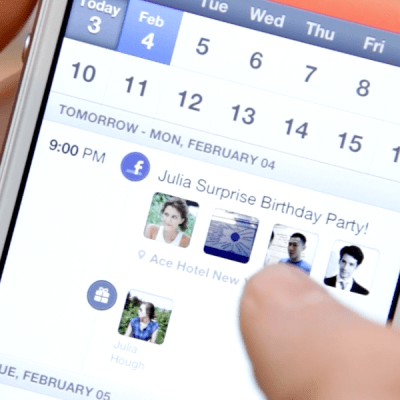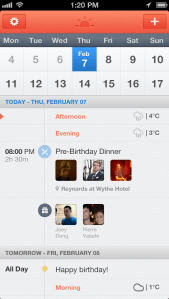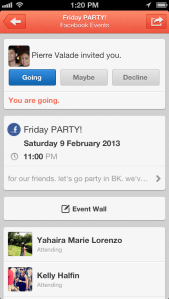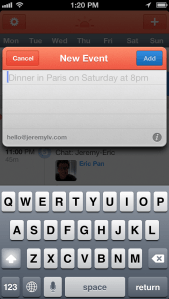When Sunrise introduced its calendar app to iOS users, it was already a crowded space. Yet, the company just raised a $2.2 million seed round led by Resolute.vc and NextView Ventures. It fosters a different approach focused on design and the user experience and will continue to experiment in the calendar space.
“For now, our first product is the iPhone app — more broadly, we actually build products that make your calendar simpler, more useful and that are able to give you the right information at the right time,” co-founder Pierre Valade said in an interview.
Founded by two ex-Foursquare designers (Pierre Valade and Jeremy Le Van), the company launched its iPhone app less than three months after focusing full-time on Sunrise. While Sunrise had to fix a few things after its launch, the app was already very polished. In addition to having a great design, its server infrastructure scaled well without having to use a queue system like Mailbox. Many people praised it.
The ability to iterate so quickly appealed to potential investors. That’s why the team could line up some well-known angels and VC companies. When talking about competitors such as Cue or Tempo, Valade said that “Sunrise is the only calendar app with a design-oriented approach.” Fantastical is not technically a competitor because it doesn’t have a server component. It is just a beautiful layer on top of iOS’s calendar APIs.
Mike Hirshland from Resolute.vc and Rob Go from NextView Ventures are co-leading the round with participation from Lerer Ventures, SV Angel, BoxGroup, 500 Startups and John Maloney from Terrapinbale. In addition to those investors, the following angels participated: Dave Morin (Path), David King (Blippy), Andrew Kortina (Venmo), Adam Nash (LinkedIn), Elliot Shmukler (LinkedIn), Hunter Walk (Youtube), Gustaf Alströmer (Airbnb), Loic Le Meur (Le Web), Bill Lee (Twist), Adam Mosseri (Facebook) and others.
In an interview (see below), Valade hinted at upcoming features and products. Widely anticipated iCloud and Exchange integrations should come soon, as well as new third-party integrations, with services such as Songkick or Eventbrite.
The New York-based company will remain a small team for the time being. “We are three right now and we are going to recruit three more people,” Valade said. “Our objective is to stay small but we need two or three more talented persons,” he continued.
I did an interview with Valade about Sunrise, calendar apps and design. This interview gives better perspective over what makes this startup different in the eyes of investors only a few months after the company’s inception.
TechCrunch: What doesn’t work with current calendars?
Pierre Valade: One of the most important issue with current calendars is that they are bad implementations of the paper version. All that you get is what you have written down in your calendar, and it is very hard to get more information from external sources. From a design standpoint, it’s a product that is very hard to approach. Users aren’t usually happy with their current calendar.
TC: What did iPhone users like about Sunrise?
“We want to bring Sunrise to new platforms and we want Sunrise to connect to more services.”
PV: Design — for the first time, an app changes the way calendar is done on a mobile phone. It’s way easier to use Sunrise than to use any other calendar app. The second point is the integration between Google Calendar and Facebook — suddenly, multiple parts of your life on different services are in the same app. You can RSVP to a Facebook event and a Google Calendar event without having to switch from app to app.
TC: Sunrise syncs with multiple services. How do people react to that and what do they use?
PV: We made a bet — people won’t switch their backend calendar, like Google Calendar, iCloud or Exchange. But that’s only one source of information on your life. There are many others: your cinema tickets, your restaurant reservations, your hotels, your Songkick Eventbrite and Facebook profiles. Soon, we will support iCloud, Exchange and more services that will allow you to gather more information at the same time.
TC: After raising this seed round, what will be the next product improvements?
PV: We want to bring Sunrise to new platforms and we want Sunrise to connect to more services. We are perfectionists and there are some things that we need to polish. Solving core problems is our top priority before thinking about new features. We have a design-oriented approach.
TC: What is the point of making your calendar sexier. Isn’t it like making Excel sexier?
PV: We aren’t making it sexier from a visual perspective, but making it work better. It means that we provide information without requiring any manual input from the user. You get some context about the person you are going to meet without having to look up information on the web — this is design as well. The interface makes all of this work hand in hand. But there is a broader question. Why, as designers, do we have this need to redesign everyone’s experience and make it better?
“It’s frustrating for designers to see people using tools that are painful to use.”
I think it’s an interesting trend. People like us are tackling pre-defined experiences like calendars or hotel reservations or plane tickets and change them using a design-oriented approach. Hipmunk did it for plane tickets, Airbnb did it with room reservations. But they radically change the experience — when you travel to another city, you want to meet new people. They wondered how they could integrate that into Airbnb. Designers just need to pick an idea and tackle the issue.
It’s frustrating for designers to see people using tools that are painful to use. There is no reason for it to stay that way. You need to recreate those tools from the ground up and ask yourself whether a calendar needs to be that way, whether Excel needs all of its features. You can always discover how users actually want to use an application. In the end, you won’t build features that are too complicated and that nobody will use.



